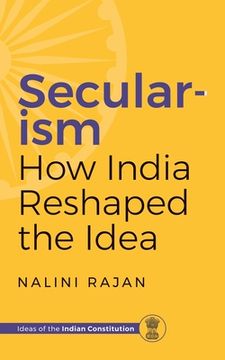Share
Secularism How India Reshaped the Idea (in English)
Nalini Rajan
(Author)
·
Speaking Tiger Books
· Paperback
Secularism How India Reshaped the Idea (in English) - Rajan, Nalini
$ 24.00
$ 30.00
You save: $ 6.00
Choose the list to add your product or create one New List
✓ Product added successfully to the Wishlist.
Go to My WishlistsIt will be shipped from our warehouse between
Monday, June 03 and
Tuesday, June 04.
You will receive it anywhere in United States between 1 and 3 business days after shipment.
Synopsis "Secularism How India Reshaped the Idea (in English)"
Secularism emerged in 17th-century Europe as an essential element of whatbecame the modern state. The separation of church and state that it entailedpaved the way for the democratic republics we take for granted today.Tolerance, as understood in the West, was sought to be introduced as statepolicy by the British in India too. But our nationalist leaders understood theircountry better than to adopt the concept without local adjustments.Political philosopher Nalini Rajan examines the tension between religiousfreedom and state intervention in India, a tension that comes with the ideaof 'principled' state intervention in matters of religion, as mandated by theConstitution. Demands for reservations and separate electorates by minoritiesin the early twentieth century had essentially ruled out absolute state neutralityin this respect. But it is only by analysing the fascinating debates on secularismin the Constituent Assembly (1946-49) that we see how and why the specificprovisions on minority rights-Articles 25 to 30-came to be adopted. Theseprovisions implicitly envisioned a key role for the judiciary. A full section ofthis book is thus devoted to understanding the role that the courts have playedin establishing, and just as importantly, defining Indian secularism-throughsuch judgements as in the Shirur Mutt case of 1954, the Durgah Committee case of1961, the Satsangi case of 1966, the Stanislaus case of 1977, the Shah Bano caseof 1985, the so-called 'Hindutva' cases of 1996, the Vaishno Devi case of 1997, and the Puttaswamy case of 2017.This exhaustive monograph should be read by all those interested inunderstanding how a distinctive secularism shaped modern India, and how thelatter shaped our secularism.
- 0% (0)
- 0% (0)
- 0% (0)
- 0% (0)
- 0% (0)
All books in our catalog are Original.
The book is written in English.
The binding of this edition is Paperback.
✓ Producto agregado correctamente al carro, Ir a Pagar.

